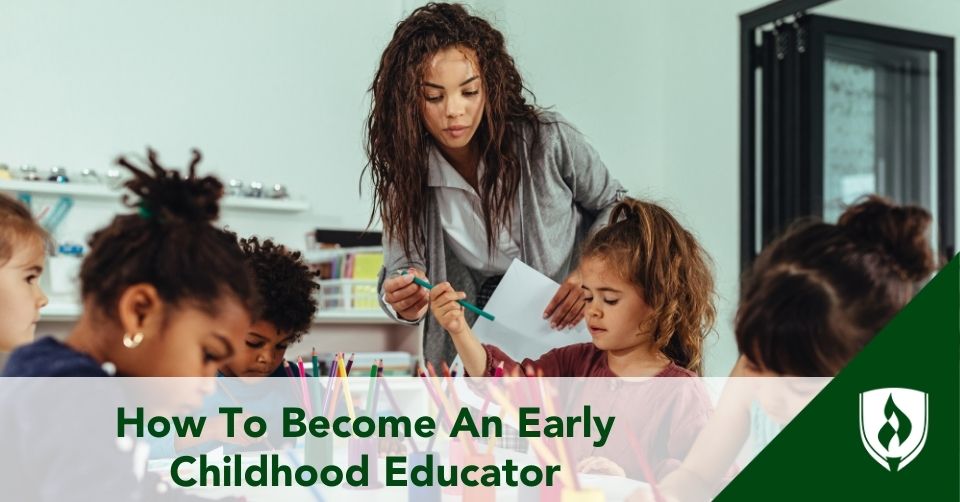How To Become an Early Childhood Educator
04/10/2025

Early childhood education prepares children for formal education1 in elementary school, including literacy, math, and social skills.
While the U.S. Department of Education does not regulate early childhood education at a national level, it is widely recognized as an essential stage of learning2. Teaching positions in these settings allow educators to work closely with young children to guide their early cognitive and emotional growth.
If you're passionate about working with young children and helping them thrive, learn how to get started on the journey to becoming an early childhood educator.
Skills Every Early Childhood Educator Needs
To become an early childhood educator, certain skills are key for success3. These include:
- Communication and Interpersonal Skills: As a childhood educator, you'll need strong interpersonal skills to interact with both children and parents, ensuring that everyone is engaged in the educational process.
- Creativity and Resourcefulness: Designing engaging lesson plans and activities that are designed to fit young children's developmental needs requires creativity. You'll create activities that foster learning through play and exploration, helping children develop both cognitive and social skills.
- Patience and Empathy: Understanding the needs of young children, especially in early childhood education settings, requires patience and empathy.
- Organizational Skills: Whether you're working as a teaching assistant, lead teacher, or preschool teacher, staying organized helps ensure that children learn in a structured environment.
- Knowledge of Child Development: Early childhood educators should be familiar with developmental milestones and know how to apply them in the classroom.
Step-By-Step Guide To Becoming an Early Childhood Educator
1. Pursue an Academic Degree
To become an early childhood educator, a bachelor's degree in early childhood education is typically required. Some students may opt for an associate degree or certificate, particularly those seeking to gain initial experience in daycare centers or community programs before pursuing further education.
At Rasmussen University, students can pursue a variety of Early Childhood Education (ECE) programs4 designed to prepare them to work with young children in childcare or non-public school settings or take on specialized roles.
These programs include a diploma, certificate, associate degree, and bachelor's degree, each offering opportunities to build foundational skills in early childhood education settings, such as childcare centers, Montessori schools, and community-based programs like Head Start.
- Early Childhood Education Diploma5: A shorter program designed to provide essential knowledge and skills to begin working with young children in non-public settings.
- Early Childhood Education Certificate6: Offers specialized training in early childhood education, ideal for those seeking a more focused skill set in areas like child development or curriculum design.
- Associate Degree7: Focuses on foundational knowledge of child development, curriculum design, and teaching strategies.
- Bachelor's Degree8: Provides a deeper understanding of child psychology, teaching methods, and leadership skills.
Rasmussen University's ECE programs focus on non-public school careers and do not lead to public school teaching licensure. However, graduates will be well-equipped to make a meaningful impact in childcare centers, non-public schools, and other early childhood settings where they can help shape the futures of young children from birth to age six.
For those interested in further specialization, a master's degree in early childhood education can provide deeper understanding and open up career opportunities in education administration or specialized teaching roles.
2. Certifications and Credentials
In addition to a formal education, early childhood educators may choose to enhance their qualifications by obtaining certifications9.
Rasmussen University's ECE programs contain coursework that is aligned with the high-quality standards of the National Association for the Education of Young Children (NAEYC®) and the Council for Professional Recognition (Child Developmental Associate, CDA®, Credential). Rasmussen University is a CDA Gold Standard Training Certification recipient institution. Its ECE program contains the following courses that provide educational prerequisites for the CDA Credential:
- ECE Curriculum and Instruction
- Foundations of Child Development
- Health, Safety and Nutrition / CDA Application
Additional CDA credential eligibility requirements apply. Please consult the CDA eligibility requirements of the Council for Professional Recognition for further details.
The CDA from the Council for Professional Recognition may be required for some career opportunities.
3. Student Teaching and Practical Experience
Gaining hands-on experience is essential for early childhood educators. Many degree programs include a student teaching component, where you can gain real-world experience in a classroom setting. Whether through volunteer work, internships, or part-time jobs in childcare centers, community programs, or summer camps, these opportunities allow you to apply what you've learned in a practical context. It also helps you gain hands-on experience in managing a classroom, creating lesson plans, and understanding the diverse needs of young children.
Explore Career Paths for Early Childhood Educators
Rasmussen University offers various specializations4 in early childhood education to enhance your skills. At the diploma and associate degree levels, you can specialize in special needs or child development, while the bachelor's degree program offers leadership and administration or child development.
With an ECE degree, you can pursue career opportunities such as early childhood teacher, teacher's assistant, special education assistant, or head start teacher, depending on your credential.
Starting as a Teaching Assistant or Teacher's Aide
Many early childhood educators start their careers as teaching assistants or teacher's aides in preschools, daycare centers, or community centers.
Teaching assistant roles provide valuable experience by allowing educators to support a lead teacher in the classroom. As you gain more experience, you may have the opportunity to manage your own classroom.
Preschool Teachers and Elementary Schools
Many early childhood educators find careers as preschool teachers or even extend their careers into teaching third grade, where they continue to guide children through early stages of formal education. Working in public schools or private schools can offer a stable career path with opportunities for professional growth and advancement.
Preschool teachers and early childhood educators play a crucial role in shaping children's early cognitive and social development, which they will carry with them throughout their education.
Childcare Centers and Montessori Schools
Another career path is working in childcare centers like Head Start or Montessori schools10, where educators focus on the holistic development of young children. These schools often prioritize child development through self-directed learning, play, and hands-on activities.
Montessori-trained educators may have specialized training that enables them to work with children in these unique settings.
Start Volunteering and Building Your Networking
Volunteering in community programs, summer camps, or daycare centers is an excellent way to gain hands-on experience in early childhood education. Volunteering can help you develop your skills while building valuable connections with other early childhood educators. Networking within the field may be helpful for staying informed about best practices and job prospects.
Build Your Professional Portfolio
As you work through your education and gain experience in the classroom, creating a professional portfolio11 can be a helpful tool. Include lesson plans, student work samples, feedback from supervisors, and any additional certifications or achievements. A portfolio helps you showcase your skills and accomplishments.
Take the Next Step
Becoming an early childhood educator involves a combination of formal education, practical experience, and specialized skills. Whether you're just starting with an associate's degree or pursuing a bachelor's degree or master's degree, there are many pathways to a career in early childhood.
From working as a teaching assistant to taking on leadership roles as a lead teacher, early childhood educators have the opportunity to shape the future of young children. With dedication, a passion for teaching young children, and ongoing professional development, you can help children learn the skills they need to thrive.
Ready To Start Your Journey?
Take action now by exploring Rasmussen University's Early Childhood Education programs.4 With flexible options, you can pursue a degree that works for your goals and make a meaningful impact in a variety of early childhood settings.
National Association for the Education of Young Children® (NAEYC) is a registered trademark.
The Council for Professional Recognition (Child Developmental Associate, CDA®, Credential) is a registered trademark.
1 U.S. Department of Health and Human Services, Administration for Children and Families, "Children's Learning and Development: Benefits of High-Quality Early Care and Education," at https://acf.gov/opre/report/childrens-learning-and-development-benefits-high-quality-early-care-and-education (visited Mar. 11, 2025).
2 International Journal of Child Care and Education Policy, "The U.S. Has No Coherent National System of Early Childhood Education," at https://ijccep.springeropen.com/articles/10.1007/2288-6729-1-1-23#:~:text=The%20U.S.%20has%20no%20coherent,and%20preferences%20of%20their%20regions (visited Mar. 11, 2025).
3 U.S. Bureau of Labor Statistics, "Preschool Teachers," at https://www.bls.gov/ooh/education-training-and-library/preschool-teachers.htm#tab-4 (visited Mar. 11, 2025).
4 Rasmussen University, "Early Childhood Education Degree Programs," at https://www.rasmussen.edu/degrees/education/early-childhood-education/ (visited Mar. 11, 2025).
5 Rasmussen University, "Early Childhood Education Diploma," at https://www.rasmussen.edu/degrees/education/early-childhood-education/diploma/ (visited Mar. 11, 2025).
6 Rasmussen University, "Early Childhood Education Certificate," at https://www.rasmussen.edu/degrees/education/early-childhood-education/certificate/ (visited Mar. 11, 2025).
7 Rasmussen University, "Early Childhood Education Associate's Degree," at https://www.rasmussen.edu/degrees/education/early-childhood-education/associates/ (visited Mar. 11, 2025).
8 Rasmussen University, "Early Childhood Education Bachelor's Degree," at https://www.rasmussen.edu/degrees/education/early-childhood-education/bachelors/ (visited Mar. 11, 2025).
9 Rasmussen University, "CDA Prep Program," at https://www.rasmussen.edu/degrees/education/cda-prep/ (visited Mar. 11, 2025).
10 ERIC, "The Early Childhood Education Workforce: Challenges and Opportunities," at https://files.eric.ed.gov/fulltext/EJ1254024.pdf (visited Mar. 11, 2025).
11 Springer, "Early Childhood Education Policy and Practice," at https://link.springer.com/article/10.1007/s13158-024-00391-4 (visited Mar. 11, 2025).



